This site is supported by our readers . We may take in a committee , at no cost to you , if you buy through contact .
sputter with a pup who think he ’s in a sled dog race ? Do n’t interest , you ’re not alone in theleash - pulling predicament ! The key to masteringdog preparation tipsfor rope pulling isconsistency and positive reinforcement .
go bystopping in your trackswhen your furry admirer pulls , only moving forward when the leash is loose . Reward good behaviorwith dainty and praise , bit by bit reducing kickshaw dependency over time . Mix it up with the " turn around " technique to keep your cad reckon and centre on you .

commend , patience is your unavowed weapon – Rome was n’t built in a day , and neither is perfect leash etiquette . Stick with it , and you ’ll be strolling in concord before you know it !
Table Of Contents
Key Takeaways
Positive Reinforcement Techniques for Leash Training
You ’re about to key out the power ofpositive reinforcementin leash breeding your puplearn about positive reenforcement .
By using treats , praise , and consistent cues , you ’ll transform those helter-skelter walks into enjoyable strolls – no more touch sensation like you ’re in a tug - of - war backing !
Using Treats and Praise to Reward Good Behavior
You ’ve become threepowerful toolsin your 3 - training toolkit : goody , congratulations , and perfect timing .
employ a variety of high - value kickshaw to keep your pup motivated and mix up your verbal encouragement for maximal butt - wagging encroachment .
Timing and Consistency in Reinforcement
Mastering the art of pure timingis super of import .
honor your whelp instantlywhen they take the air nicely .
body is key — spliff to your training plan like glue for faster , hold up results .
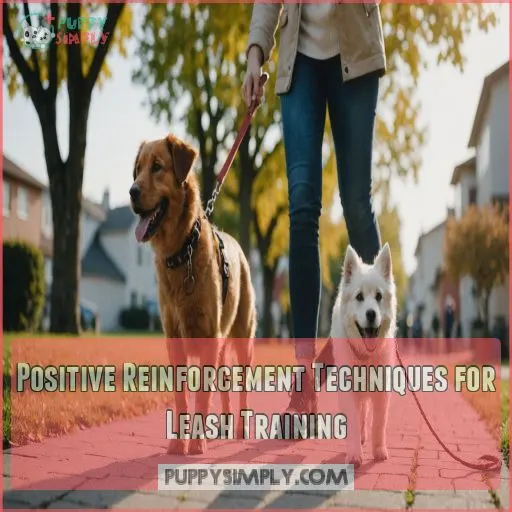
Gradually Reducing Treat Dependency
Once your whelp ’s getting the hang of it , start easing up on the treats .
Mix in congratulations and favorite alongside snacks .
Graduallyspace out rewards , preserve your furred friend guessing and engaged .

Verbal Cues and Hand Signals for Walking
Choose a light word or phrase as your walking cue stick . geminate it with a consistent hired man signal . Your dog will apace learn to associate these cues with on the loose - leash walking .
Stop and Go Method for Leash Pulling
You ’re about to discover a simple yet in force method to curb your dog ’s leash - pulling habit .
TheStop and Gotechnique is agame - changerthat’ll transform your base on balls from a tower - of - state of war into a pleasant stroll , using your whelp ’s natural curiosity to your advantage .
Stopping Immediately When the Dog Pulls
You ’ve masteredpositive reinforcement , now have ’s harness thepull .
When your furred friend lunges ahead , stop in your tracks .
This simple human action speaks volumes :
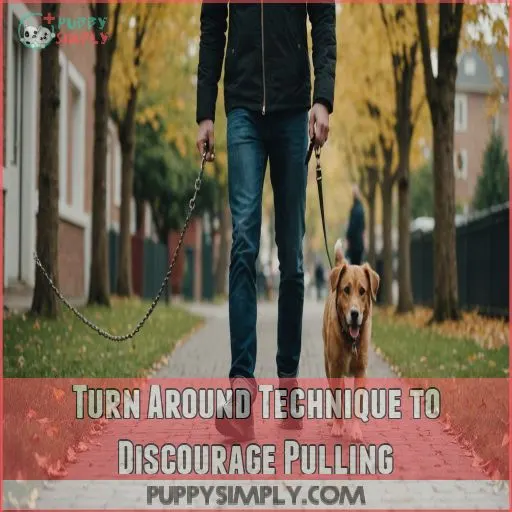
Waiting for the Dog to Return or Loosen Leash
After block off , stand your ground . Keep the leash blotto , but do n’t get out back . Watch for mansion your pup ’s getting antsy . Patience is key — they’ll finally wait back or tease apart up .
Rewarding the Dog for Returning to Your Side
When your furry champion returns to your side , it ’s address time ! Here ’s your four - gradation reward program :
Resuming Walk Only When Leash is Slack
Consistently resume your manner of walking only when the leash is drop-off . This teaches your pup that a loose leash is their slate to adventure . It ’s a winnings - profits : you saunter , they get a line !
Turn Around Technique to Discourage Pulling
If your dog ’s pull out you around like a sled dog , it ’s metre to try theturn - aroundtechnique .
Thissimple yet effectivemethod teach your pup that pulling trail to the opposite of what they want , construct walk more pleasurable for both of you .
Changing Direction When the Dog Pulls
You ’ve mastered the barricade - and - go technique , but your pup ’s still pulling ? Time to switch it up ! Theturn - around methodis your occult weapon . Here ’s how it figure out :
This keeps your furry friend on their toe , transform walks into an exciting biz of " follow the leader . " Your heel ’s natural curiosity will have them keenly anticipating your next move , makingleash - pullinga thing of the past .
Teaching the Dog to Pay Attention to Your Movements
Now that you ’ve change direction , it ’s time to become a canine mind - reader ! Your whelp want to tune into your every move like you ’re the star of their favourite show .
By reinforce yourleadership , you ’ll make a harmonious walk experience . Your wiener will find out to follow your cues readily .
Dealing With Repeated Pulling in New Directions
When your whelp keeps pulling , do n’t give in the towel ! Turn on your heels and take the air the opposite way . repetition as needed , rewarding each fourth dimension they fall out your lead .
Choosing the Right Equipment for Leash Training
pick out the right train for yourleash - trainingjourney can make all the dispute in subdue your puppy ’s inner sled dog .
Let ’s explore the bestleashes , collars , and harnesses to turn your casual walks from a tug - of - war into a easy promenade .
Selecting an Appropriate Leash Length and Material
Choosing the right deuce-ace is important for successful grooming . You ’ll desire to think about :
Flat Collars Vs. Harnesses for Different Breeds
Consider your cad ’s material body and behaviorwhen deciding betweenflat collarsandharnesses .
categoric collarswork well forcalm strain , whileharnessesoffer better control forstrong pullersorbrachycephalic heel .
Avoiding Choke Chains and Prong Collars
dump those choke Ernst Boris Chain and prong choker ! They ’re former news show and can harm your furry friend . Instead , embrace kinder alternative that ’ll make both you and your puppy well-chosen during walks .
Specialized No-pull Harnesses and Their Effectiveness
Now , allow ’s explore no - drag harnesses . They ’re a game - changer for many pup parent ! These harness mold by airt your dog ’s pull effect , make walks a child’s play . But are they truly effective ?
Building Engagement During Leash Walks
desire to metamorphose your dog ’s leash manner of walking from a chore to a pleasure ?
By making walks more piquant and exciting , you’llcurb tercet - pullingand also strengthen your bond with your furred champion .
Making Walks Unpredictable and Exciting
Make your walksa thrilling adventure !
storm your pup with unexpected tour , new routes , and exciting Hell stops .
You ’ll keep themguessing and engaged , turn leash time into a fun - filled journey .
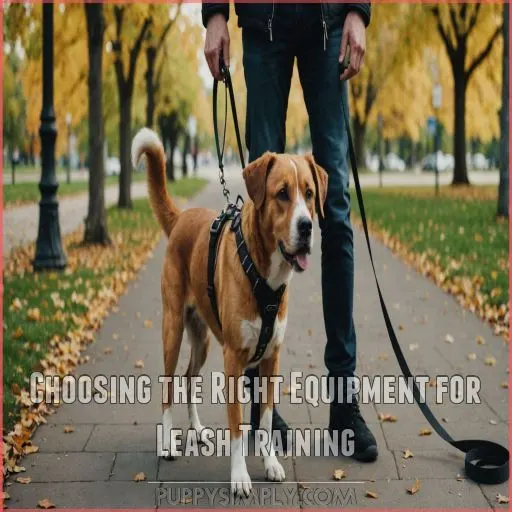
Incorporating Games and Training Exercises
permit ’s spice up your walks with some playful training games ! Hide - and - seek , fetch - and - release , or a quick unit of ammunition of tug - of - war can transform a routine stroll into an exciting adventure for your whelp .
Using Environmental Rewards for Good Behavior
Beyond game , you’re able to leverage your dog ’s surroundings as rewards . When they take the air nicely , allow them to sniff that intriguing lamppost or greet a friendly neighbor . It ’s a win - winnings !
Balancing Structured Walking With Exploration Time
ideate ahappy medium : structured walkspaired withsniff - fill adventures .
You ’ll keep your pup engaged by mixingfocused hound timewithoff - leash explorationin good country .
It ’s the best of both worlds !
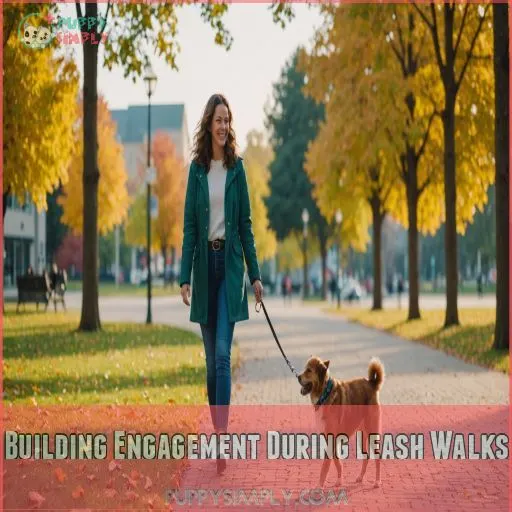
Addressing Specific Leash Pulling Scenarios
You ’ve control the BASIC , but now it ’s time to harness those trickyleash - pullingscenarios that every dog owner faces .
Whether your whelp go bonkers at the sight of another dog or reverse into a four - legged bulldozer when turn on , we ’ve some useful tips forcommon leash challenge .
Dealing With Pulling Towards Other Dogs
When your pup blot another frankfurter , they might turn into afour - legged projectile !
This behaviour ’s often rooted infearoroverexcitement .
Do n’t worry – we ’ve got strategies to keep Fido focalize on you .
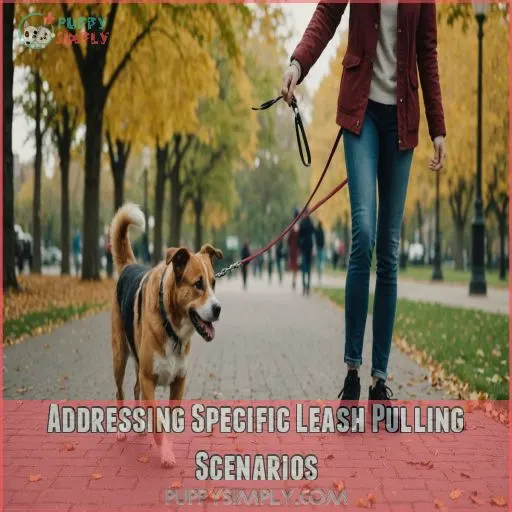
Managing Excitement-induced Pulling
Excitementcan wrench your pup into a furred rocket !
Tocurbthat enthusiasm , start walk calmly .
Watch for thosepre - launching signalsand redirect their energy before liftoff .
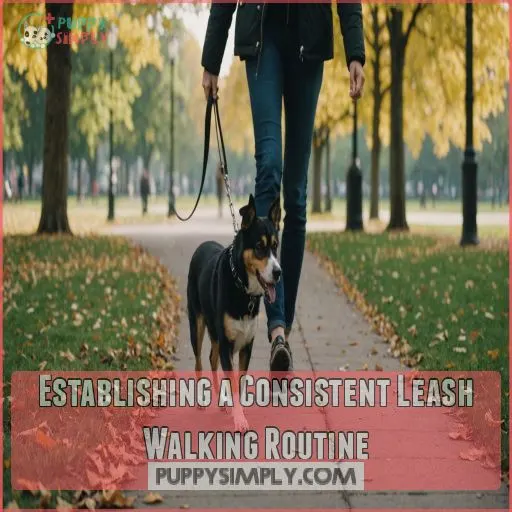
Timingis everything with rewards !
Handling Fear or Anxiety-related Pulling
Got ascaredy - pupon your hands ? Fear not ! To tackleanxiety - driven pull , begin by identifying triggers .
Then , practice treats and praise to create positively charged associations .
Gradually discover your furry friend to fear - inducing stimulation .

Leash Manners for Different Environments (urban Vs. Rural)
Urban or rural , your pup ’s leash manners matter . In busy street , keep ’em close with a shorter triad . state walks ? allow ’em roam a flake more . Adapt to your environment !
Establishing a Consistent Leash Walking Routine
Establishing a consistentleash walkingroutine is your ticket to tenseness - complimentary perambulation with your furred friend .
By localise clear expectation and creating apre - walkway ritual , you ’ll transmute your dog from a helter-skelter dragger into a cultivated walking comrade , take a leak every outing a tail - wagging achiever .
Setting Clear Expectations for Walk Behavior
You ’ve tackled specific scenarios , now let ’s lay down the law for manner of walking . Set clear rules : no pulling , remain close , and listen your manners . Your pup’ll thank you subsequently !
Creating a Pre-walk Ritual to Set the Tone
Set the stage for a successful walk with apre - walk rite . It ’ll get your pup in the right mentality and establish positive prospect .
Maintaining Focus Throughout the Entire Walk
innumerous distractionscan derail your puppy ’s focus during walks .
Keep their attentionby turning walking time into game time .
combine in quick training exercisesto prevent ennui and hike up genial arousal , like those found inmental stimulationsections .
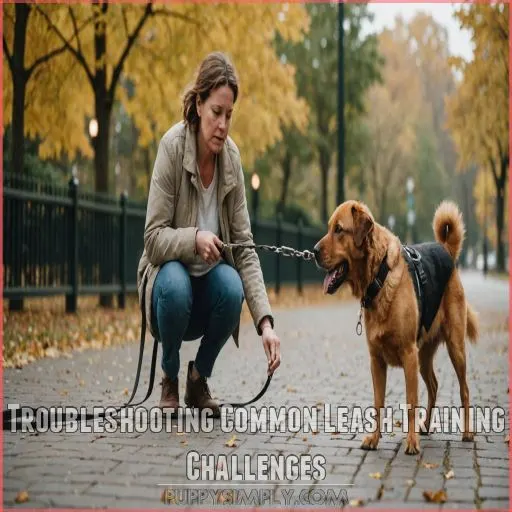
Gradually Increasing Walk Duration and Difficulty
Once your domestic dog ’s down pat canonical leash manners , it ’s metre toup the ante !
bug out stretch those walks , mixing in new terrains , and throwing curveballs withdistractions .
Your pup ’s skills willskyrocket !
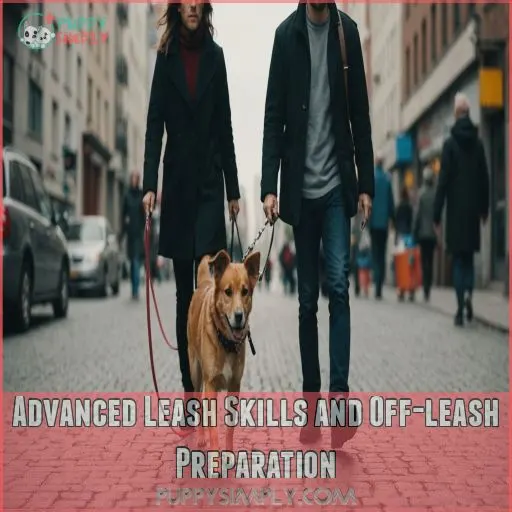
Leash Training for Different Dog Ages
You ’re not alone if you ’ve wondered whetherleash trainingdiffers for puppy , grownup pawl , and elder .
permit ’s exploreage - specific techniquesand stock considerations that ’ll help you tailor your feeler , do walks a gentle wind no matter your dog ’s liveliness stage .
Puppy-specific Leash Training Techniques
While puppies are frantic to explore , theirshort care spansrequire a blue approach .
Start with abbreviated , positive sessions using a lightweight harness .
Reward often and keep it fun — you’re build a lifelongwalking buddy !
Adapting Methods for Adult Dogs With Ingrained Habits
big dog with ingrained substance abuse ? Do n’t chafe ! you’re able to teach an honest-to-god dog new tricks . Reframe their mindset by consistently rewarding ripe behavior . It ’s all about patience and plus reward .
Senior Dog Considerations in Leash Training
Trainingsenior dogsrequires a gentle tactual sensation . Your get on fellow traveler may look unique challenges , but with patience , you may teachold track new tricks !
Breed-specific Challenges and Solutions
dissimilar breed presentunique leash - training challenges . You ’ll need specific strategies to address theirspecific traits . Here ’s a quick pathfinder to facilitate you tacklecommonbreed - specificissues :
Leash trainingcan be gainsay , depending on the dog ’s breed .
Troubleshooting Common Leash Training Challenges
Even with the best technique , you might chance some hiccups in yourleash trainingjourney .
Let ’s harness common challenge likeleash responsiveness , easily disorder whelp , high - energy dogs , and refractory behavior to help you and your furry Quaker become sidewalk mavin .
Overcoming Leash Reactivity and Lunging
You ’ve master age - specific education , but what about leash reactivity ? It ’s like your pawl becomes a different creature ! Let ’s tackle this challenge head - on with some proven techniques to reconstruct calm walks .
Dealing With Easily Distracted Dogs
Walking a distrait dog can feel like herd computed axial tomography . To keep your pup focused :
Managing High-energy Dogs During Walks
Everyone ’s been there : your industrious pup turns walks into marathon !
prove frank ballpark visitsfor pre - walk zoomies , then engage their judgment with training games .
Short bursts of exercisecan work wonders too .
Addressing Stubborn or Resistant Behavior
Why does your pup resistleash training?Stubbornnessoften stems from confusion or fear .
Stay patient , use positive strengthener systematically , and view a harness .
If you ’re stuck , do n’t hesitate to seek professional assistant .
Advanced Leash Skills and Off-leash Preparation
You ’ve mastered the basic ofleash training , but now it ’s meter to take your Canis familiaris ’s accomplishment to the next degree .
Advanced techniqueswill have your pup walk like a pro and ready them for off - leash adventures .
Teaching Heel Position for Controlled Walking
You ’ve tackled common challenges , now countenance ’s elevate your secret plan ! Teaching your puppy to heel is n’t just forshow dogs . It ’s your confidential weapon for tension - free walks and off - tether adventures .
Incorporating Distance and Duration in Training
Start small and dream openhanded ! bit by bit increase your walk length and distance goals . set up naturalistic metre limits , then slowly stretch out them . Your whelp ’s endurance will rise alongside your bond .
Transitioning From On-leash to Off-leash Reliability
Moving to off - rope reliabilityis a ticklish dance .
Begin in dependable , enclose spaces , gradually increase distance and distractions .
Remember , your pup’srecallis their lifeline to freedom — make it irresistibly rewarding !
Proofing Leash Manners in Various Environments
Now that your pup ’s leash attainment are rock - upstanding , countenance ’s take them for a spin in different preferences . pattern makes unadulterated , so strike the dog park , metropolis street , and hike up trail !
Frequently Asked Questions (FAQs)
How to train a dog to stop pulling on a leash?
Tired of feel like a kite in the wind ?
You’lltame that leash - pulling pupby stopping when they pull , rewarding wanton - leash walk , and using positive reinforcement .
Mix up your walksto keep ’em engaged and attentive .
What is the best tool to stop a dog from pulling?
You ’ll feel the best tool is n’t a gadget , butpositive reward .
Use treats and praise to rewardgood walking behavior .
A well - fitted harness can aid , but recollect , it ’s your ordered training that ’ll unfeignedly stop the pulling .
What is the command for a dog to stop pulling?
Like a master directing an orchestra , you ’ll guide your puppy with aclear dictation .
Choose a musical phrase like " allow ’s go " or " With me . "
Use it systematically , pair it with electropositive strengthener to instruct your dogloose - leash walking .
How to stop a strong dog from pulling and lunging?
Stop take the air when your dogpulls or lunges . Stand still , keeping the 3 tight . Wait for them to see back , then reward with praise and treats .
Consistency is key – never grant forward apparent motion while pulling .
praxis establish perfect !
How long does it take to stop leash pulling?
Did you know78 % of dog owners struggle with tether pull ?
It ’s ajourney , not asprint .
eubstance ’s Francis Scott Key , but expect4 - 6 weeks of consecrated training .
Remember , your puppy ’s erudition curve is alone – patience pays off !
Can leash pulling cause health issues for dogs?
Yes , leash pullingcan harm your dog ’s health .
You ’re risking neck injury , back trouble , and even tracheal impairment .
It ’s not just annoying – it ’s a real hurting in the neck for your furred Quaker !
Should I use treats during every leash training session?
film treats astraining arugula fuel !
You ’ll want to start with a high - octane intermixture , gradually taper off as your pup master the ternion .
Eventually , you ’ll cruise on kudos alone , but keep some treats ready to hand for tricky site .
How do I leash train multiple dogs simultaneously?
Start withindividual training sessionsfor each firedog , which is critical for preventinglittermate syndrome .
Gradually introduce them together , using disjoined handlers ab initio .
Reward calm behaviorand focus on you .
Gradually increase difficulty , always prioritizing safety and incontrovertible reinforcing stimulus .
It ’s a juggling turn , but you ’ve catch this !
Are certain breeds more prone to leash pulling?
Just as a fish takes to piss , some strain course pull more .
High - energydogs like huskies and retrievers oftentugging forward .
But do n’t fret ! With consistent training , you’re able to instruct any breed idle - leash walking .
Conclusion
Practicingpatiencepays off whenperfecting your pup ’s perambulation ! Remember , masteringdog preparation tipsfor leash take out take time and consistency .
You ’re now outfit with a toolkit of technique to transform your walks from tower - of - war to teamwork .
Stay positive , keep treats ready to hand , andcelebrate small victories . With perseverance , you ’ll shortly be strolling in sync , enjoying peaceful walks together .
So leash up , step out , and savor the journeying of building a stronger bond with your four - legged friend . Happy trailsawait !